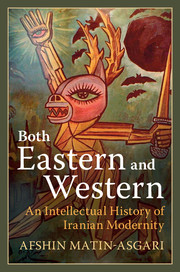Crossref Citations
This Book has been
cited by the following publications. This list is generated based on data provided by Crossref.
Pirzadeh, Ali
2019.
Modern Iran in Perspective.
p.
11.
Soleimani, Kamal
and
Mohammadpour, Ahmad
2019.
Can non-Persians speak? The sovereign’s narration of “Iranian identity”.
Ethnicities,
Vol. 19,
Issue. 5,
p.
925.
Steele, Robert
2019.
The Pahlavi National Library Project: Education and Modernization in Late Pahlavi Iran.
Iranian Studies,
Vol. 52,
Issue. 1-2,
p.
85.
Soleimani, Kamal
and
Mohammadpour, Ahmad
2020.
The securitisation of life: Eastern Kurdistan under the rule of a Perso-Shi'i state.
Third World Quarterly,
Vol. 41,
Issue. 4,
p.
663.
Powel, Brieg
2020.
Blinkered Learning, Blinkered Theory: How Histories in Textbooks Parochialize IR.
International Studies Review,
Vol. 22,
Issue. 4,
p.
957.
Shannon, Matthew K.
2020.
A Companion to U.S. Foreign Relations.
p.
985.
Saffari, Siavash
2021.
Taqi Erāni, Bizhan Jazani, and a Marxian Framework for the Critique of Religion in Twentieth Century Iranian Political Thought.
Iranian Studies,
Vol. 54,
Issue. 5-6,
p.
859.
Sadeghi-Boroujerdi, Eskandar
and
Yadgar, Yaacov
2021.
Jalal’s Angels of Deliverance and Destruction: Genealogies of Theo-politics, Sovereignty and Coloniality in Iran and Israel.
Modern Intellectual History,
Vol. 18,
Issue. 1,
p.
223.
Alizadeh, Naseraddin
2021.
Ibrat,hasrat,ortahdid: Turkish modernity in the eyes of Iranian nationalist modernists in the Qajar-Pahlavi interregnum.
Turkish Studies,
Vol. 22,
Issue. 4,
p.
558.
Bostani, Ahmad
2021.
Henry Corbin’s Oriental Philosophy and Iranian Nativist Ideologies.
Religions,
Vol. 12,
Issue. 11,
p.
997.
Rezaei, Mohammad
2021.
The Origins of the Early Iranian Enlightenment: The Case of Akhundzade’s “Qirītīkā”.
Contemporary Review of the Middle East,
Vol. 8,
Issue. 1,
p.
9.
Baghoolizadeh, Beeta
2021.
From Religious Eulogy to War Anthem.
Comparative Studies of South Asia, Africa and the Middle East,
Vol. 41,
Issue. 3,
p.
441.
Khademnabi, Mir Mohammad
and
Khazaee-Farid, Ali
2021.
The Persian Freud: Freud’s early reception through translation between the 1930s and 1970s in Iran.
International Forum of Psychoanalysis,
Vol. 30,
Issue. 2,
p.
75.
Figueroa, William A.
2022.
Performative Diplomacy: Iran–Republic of China Relations, 1920–1949.
Iranian Studies,
Vol. 55,
Issue. 2,
p.
379.
Mohammadpour, Ahmad
and
Soleimani, Kamal
2022.
Silencing the Past.
Current Anthropology,
Vol. 63,
Issue. 2,
p.
185.
Søltoft, Mette Hedemand
2022.
The Danish Orientalist Arthur Christensen's Visit to Iran in 1929 and His Meeting with the Iranian Intelligentsia.
Iranian Studies,
Vol. 55,
Issue. 1,
p.
3.
Anzali, Ata
2022.
From Ethnic Nationalism to Cosmopolitan Mysticism: The Life and Works of Hossein Kazemzadeh Iranshahr (1884–1962).
Iranian Studies,
Vol. 55,
Issue. 1,
p.
61.
Tüyloğlu, Yavuz
2022.
Rewiring unevenness: the historical sociology of late modernisation beyond the west/east duality.
Cambridge Review of International Affairs,
Vol. 35,
Issue. 3,
p.
314.
Cole, Camille Lyans
2022.
The Ottoman Model: Basra and the Making of Qajar Reform, 1881–1889.
Comparative Studies in Society and History,
Vol. 64,
Issue. 4,
p.
1024.
Lolaki, Seyed Mohammad
2022.
Another Brick in the Wall.
Religious Studies and Theology,
Vol. 41,
Issue. 1,
p.
77.



